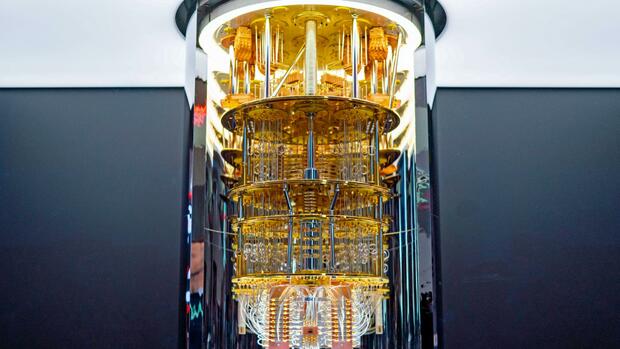Quantum computers are considered a disruptive technology of the future because they can theoretically solve arithmetic tasks that today’s supercomputers fail.
(Photo: dpa)
Berlin Germany actually wants to play at the forefront of quantum computing – on an equal footing with the USA and China. The federal government only presented a three billion euro concept for this in April. But now savings are to be made on a central funding program.
As a result, “very promising start-ups run the risk of getting nothing in the second round of financing,” warns the Union’s research policy spokesman in the Bundestag, Thomas Jarzombek.
Because if the federal government does not provide additional funds, there is a risk of a funding gap and the start-ups would be completely dependent on money from the USA and other countries to finance their further growth.
“Potential US venture capitalists could secure ten to 20 years of German development work at a bargain price,” says the Christian Democrat, who was the Federal Ministry of Economics and Technology Commissioner for the Digital Economy and Start-ups until 2021.
The budget just presented for 2024 will make the situation even worse, because the crucial items for quantum technology have even been cut there. “It’s just intense,” says Jarzombek. And that despite the fact that Germany has so far been “the world leader in one of the absolute future technologies”, especially in research. Precisely because quantum computers “are of very great importance for our technological sovereignty”, the government should by no means gamble away.
Crucial tool for start-ups
Quantum computers are considered a disruptive technology of the future because they can theoretically solve arithmetic tasks that today’s supercomputers fail: find new medicines, break cryptographic keys and solve logistical problems. This is especially true in connection with artificial intelligence: Quantum computers could, for example, accelerate the training of neural networks for AI, which are needed for the development of autonomous driving, for example.
The IT giants Google and IBM like to give the impression that they will make up the so-called quantum supremacy among themselves. But scientists are questioning this and relying on completely different technical approaches. This is one of the reasons why the German government sees a good chance of being at the forefront here.
The quantum funding of the old federal government, on which the three-billion traffic light concept is based, is considered by experts to be a good foundation for building up your own German players.
The decisive instrument for start-ups is a program of the German Aerospace Center (DLR), which awards contracts to them – above all for the construction of quantum computers, but also for quantum software. The program has a volume of EUR 600 million and will run from 2022 to 2026. A total of EUR 350 million was spent last year and this year.
No funds in the budget for funding
But now the federal government is stepping on the brakes. All departments have to save on the budget for the coming year. The budget for 2024 no longer provides any funds for this program, says Jarzombek, “this means that the funding has been reduced to 350 million euros so far”.
If Germany and Europe want to become technologically independent here, the money should also come from Europe. Jan Leisse, founder of the quantum hardware start-up Eleqtron
In addition, the funds available so far are almost completely planned. “And because there is still no market for quantum technology, the state must continue to act as an anchor customer for this future technology. To do this, however, he would have to lengthen and expand the DLR program – instead of cutting it.”
The fact that this is not planned is also shown by the federal government’s response to a small question from the Union faction, which the Handelsblatt has received. According to the answer, the companies would “explore all financing options in their own interest and also apply to venture capitalists from public funds,” it says.
However, this is not easy in Germany, says Jan Leisse, founder and CEO of the quantum hardware start-up Eleqtron. “In the medium term, German start-ups that develop expensive quantum hardware need a lot of capital in order to develop further.” Of course, there are large venture capitalists from the USA, China and Saudi Arabia who are interested. But “if Germany and Europe want to become technologically independent here, the money should also come from Europe”.
>> Read also: How Germany wanted to catch up in quantum technology
However, public German venture capital providers – such as High-Tech Gründerfonds or the agency for leap innovations – primarily invest in the early stages of start-ups with far smaller sums. In general, European venture capitalists are nowhere near the level of their international competitors. In addition, there is currently a general weakness in the industry.
And while corporations such as Google, Microsoft and IBM are investing large sums in quantum technology in the USA, “there are only a few in Germany like the laser specialist Trumpf who are involved here,” says Leisse. For all these reasons, “a signal from politicians would be helpful now that things will continue even after the current DLR program has expired, in order to maintain the high pace of quantum computer development,” says the Eleqtron founder.
More: Siegen start-up wants to compete with Big Tech

